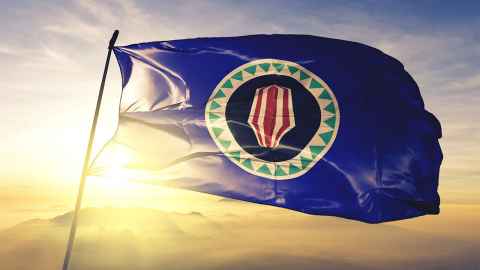The Bougainville Referendum: now what?
14 September 2020
Opinion: Bougainville’s fate is a microcosm of similar struggles all over the world. Jason Brown explains why it's worth watching this autonomous region with interest.

Last December the Autonomous Region of Bougainville, an area in Papua New Guinea (PNG), voted in a referendum for independence, a move motivated by a history of violence and conflict.
A decade-long civil war in the 1990s, often referred to as the ‘Bougainville crisis’ (those familiar with the Lloyd Jones novel Mr Pip will recognise the setting) devastated the region.
This war was the product of decades of colonisation, and came to a head because of disputes over large-scale mining. The conflict was originally with PNG, but fighting spread amongst different local factions and the December referendum was a condition imposed by the Bougainville Peace Agreement of 2001, where voters were asked whether they wanted more autonomy or independence.
The referendum concluded on December 7, 2019, and a final vote count was announced four days later. The voter turnout was significant, with 87.6 percent of the population of eligible voters (a total of 206,731) making it to the polls. In comparison, the last national election in New Zealand resulted in 79.01 percent voter turnout (according to the NZ Electoral Commission), in the US it was 55.7 percent (according to the US Census Bureau), and in the UK it was 67.3 percent (according to a report in the House of Commons Library).
And while polling stations were made available in a great number of wards, travel to the polls was not always convenient, particularly for those who live in rural villages and in regions largely cut off from the more urban centres, where travel is on foot and along unsealed roads. The high turnout suggests a determined population and one that has had to wait decades for this opportunity to vote.
The results are astonishing: 98.3 percent voted for independence (1.7 percent voted for more autonomy). While the vote is non-binding, there are indications from PNG that Bougainville may be granted its independence if it can demonstrate economic self-sufficiency (as indicated by the PNG Prime Minister, James Marape), although PNG wants to maintain a national ‘unity’, so most likely won’t give up control easily.
The referendum received worldwide attention, including in New Zealand, which has been heavily invested in the region through its long-term peacekeeping efforts. Its lead up was closely observed, both by international peacekeepers, and by the press, with many claiming Bougainville could be the next ‘new nation’.
However, it’s not typical for independent states to emerge (or decay) overnight. Take the breakup of the Soviet Union, where once autonomous regions, like Abkhazia, have struggled for recognition as independent states. The parallels for Bougainville are clear, and some have noted real independence may take decades.
Currently, discussions about independence and structure of an interim government are being led by various groups (such as the Bougainville Indigenous Dialogue), as well as representatives from different districts. Education remains at the top of the wishlist as many Bougainvilleans struggle to pay costly school fees, as well as a desire for a system where local languages can be taught.
However, access to medicine, better international relations, the problem of economic dependency, exports/imports, international travel and biosecurity, are all on the agenda and largely come down to resourcing and the need for more of it.
Bougainville is now in the middle of yet another period of voting: this time for the next Autonomous Bougainville Government, including the position of president. The election ran from August 12 to September 1, and the ballot counting is now set to conclude on September 24.
It’s been easy for the world to forget the accomplishments of the December referendum, particularly in a time when nearly all attention has shifted to the global Covid-19 pandemic (a factor which itself has threatened to disrupt the elections).
However, the most crucial time for the development of Bougainville’s future is now, as the makeup of the ABG will be the most significant factor in determining the region’s fate. It will be the ABG that negotiates the status of the Autonomous Region with PNG, and as voters overwhelmingly voted for independence, people need to have trust in their regional leadership.
And there’s no shortage of potential leaders as the ballot includes 25 candidates for president, all from a range of backgrounds, not to mention 440 candidates running for only 40 parliamentary seats.
There has already been doubt over the elections’ credibility, and there is widespread concern over ongoing accusations of corruption within the government, and mistrust over an extended state of emergency order imposed on the region due to Covid-19, resulting in the unauthorised opening of the markets in Arawa).
The referendum and the current elections provide a snapshot of what is a unique development in the Pacific and which has implications for other, similar regions; for example, New Caledonia and Chuuk, and their upcoming referenda for independence.
Will Bougainville gain economic and political independence? Will the new composition of the ABG win the people’s trust? Will post-referendum negotiations be undertaken with the best interests of the people in mind?
As a microcosm of similar struggles all over the world, Bougainville’s fate is an important one and well worth watching with interest.
Associate Professor Jason Brown is from Cultures, Languages and Linguistics Department.
This article reflects the opinion of the author and not necessarily the views of the University of Auckland.
Used with permission from Newsroom The Bougainville Referendum: now what? 14 September 2020.
Media queries
Alison Sims | Research Communications Editor
DDI 09 923 4953
Mob 021 249 0089
Email alison.sims@auckland.ac.nz